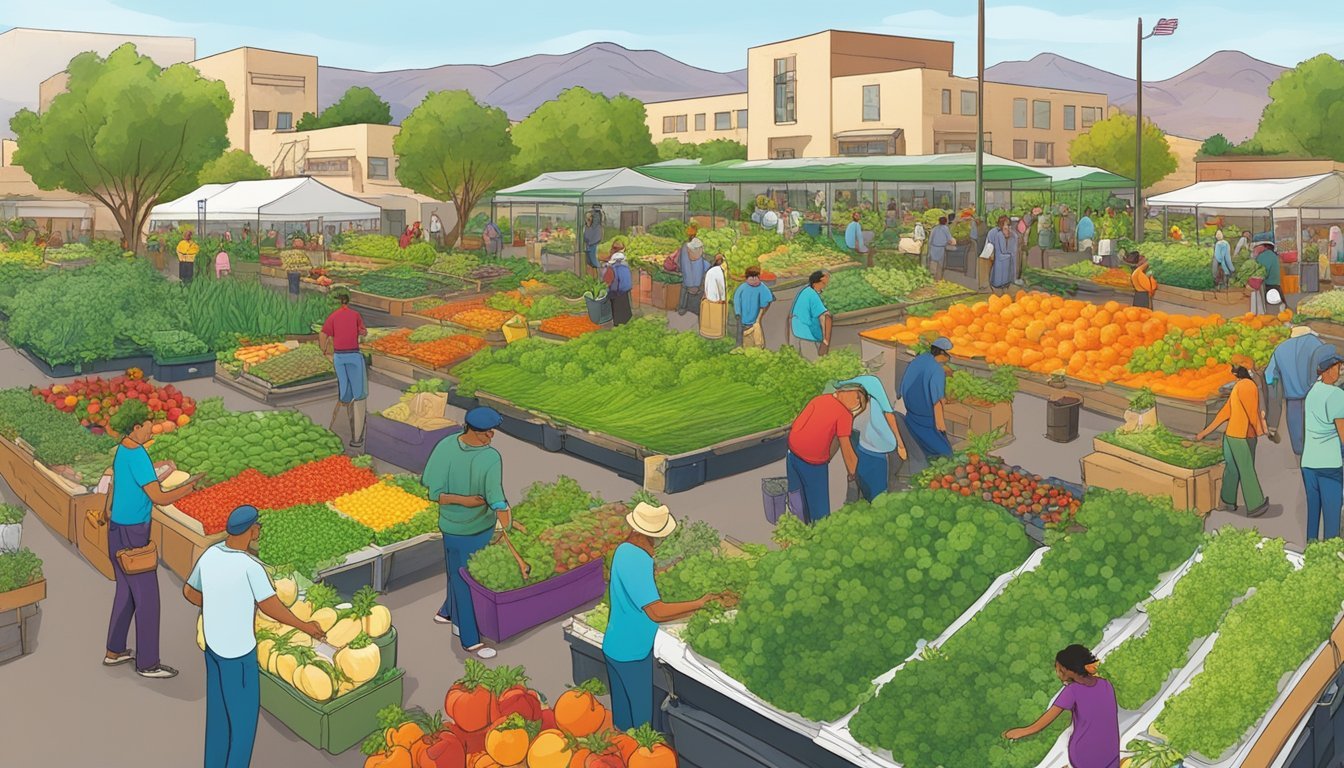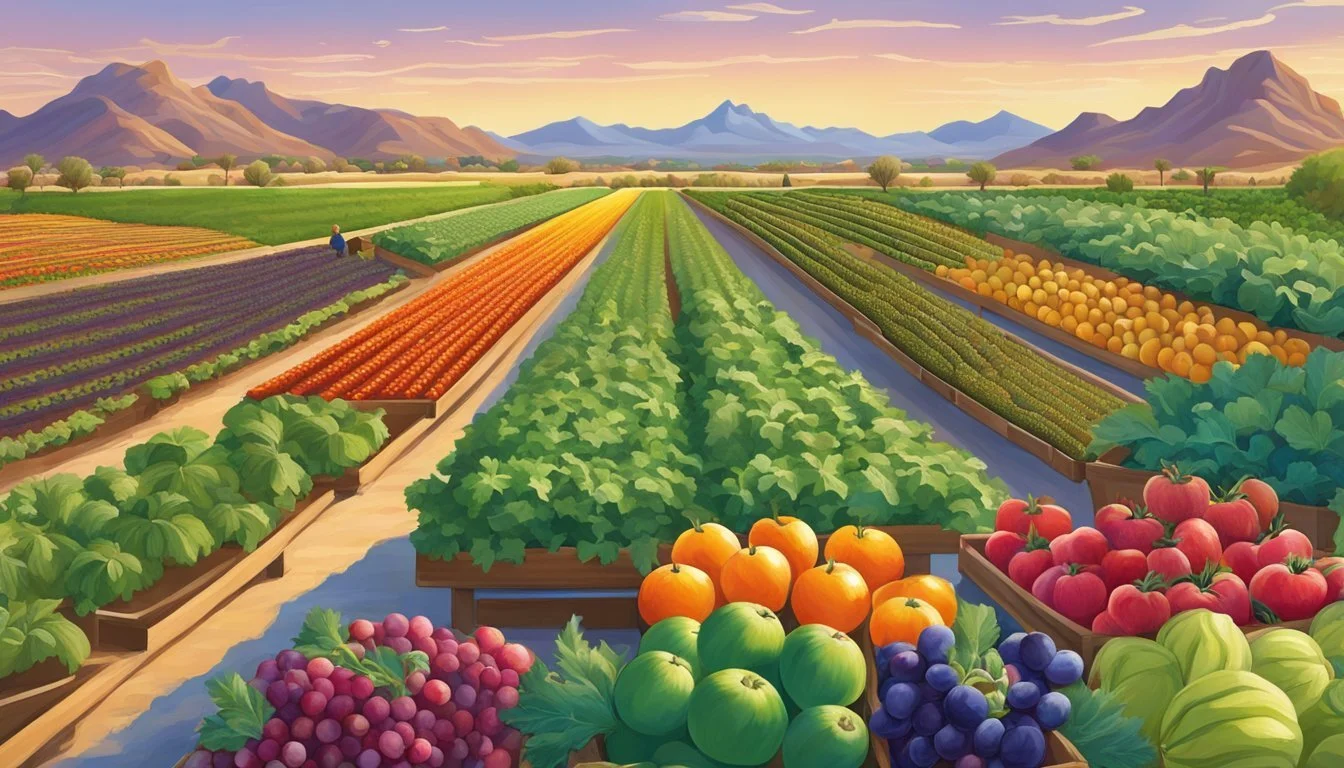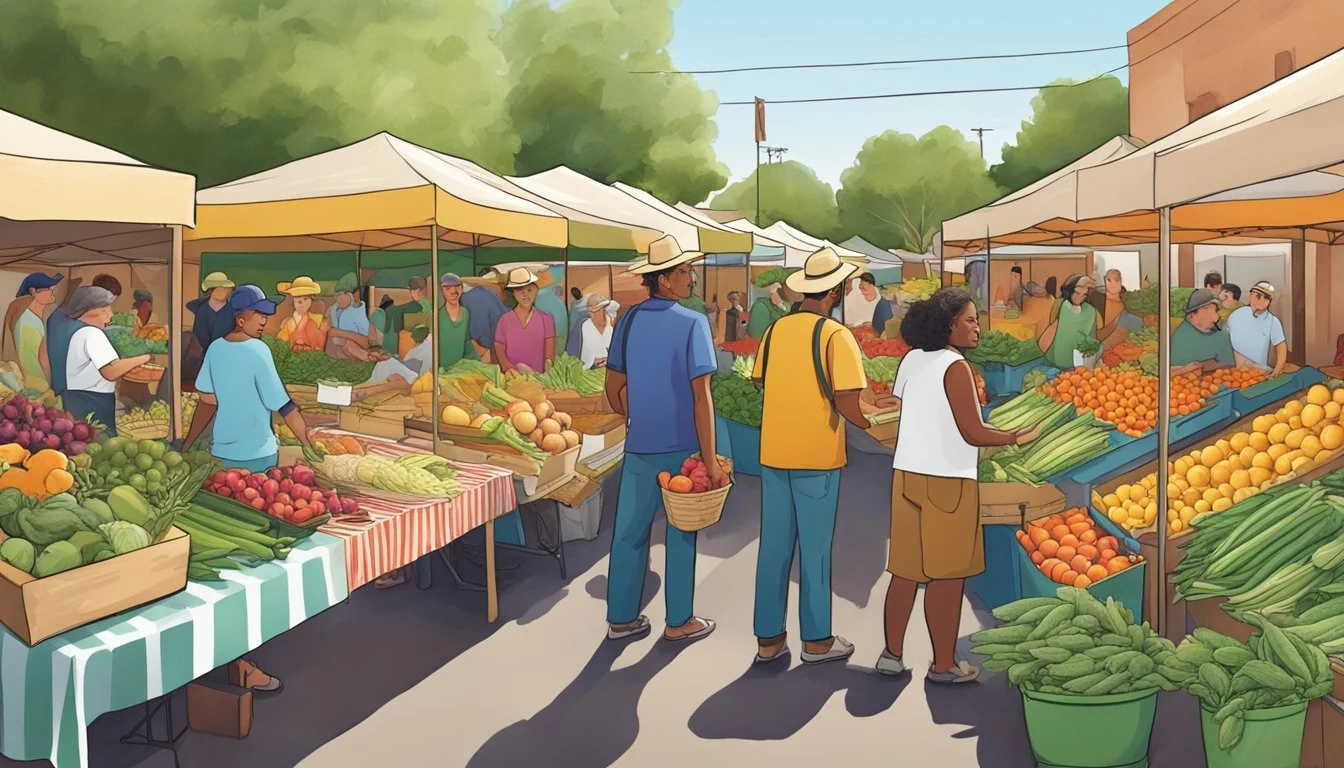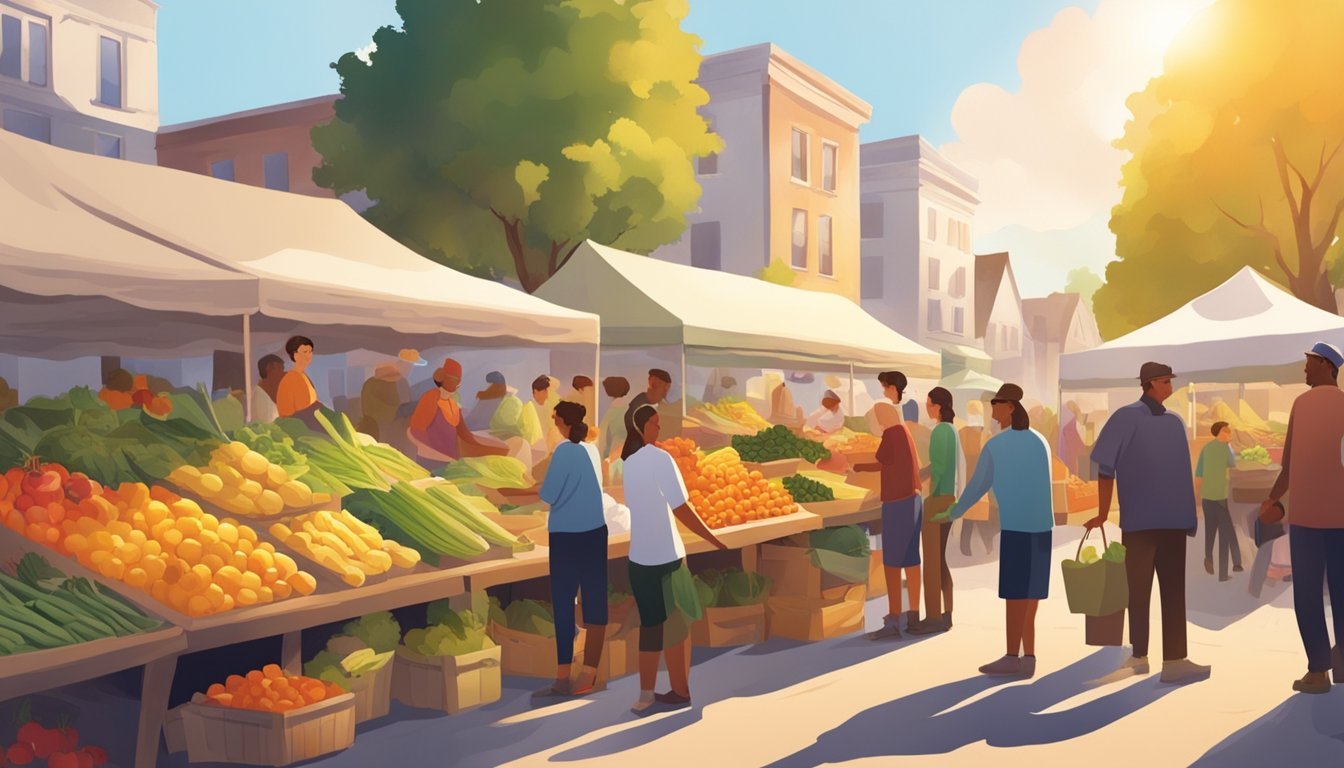Community Supported Agriculture (CSA) in Tempe, AZ
A Guide to Local Farm Partnerships
Community Supported Agriculture, commonly known as CSA, has taken root in Tempe, Arizona, fostering a symbiotic relationship between local farmers and the community. Through CSA programs, residents of Tempe have the opportunity to purchase shares of a farm's harvest in advance, directly supporting local agriculture and receiving a regular supply of fresh, locally-grown produce. These programs not only ensure that consumers get access to seasonal fruits and vegetables but also provide a stable income for farmers, enabling them to plan and manage their crop production with greater certainty.
With a focus on sustainability and community well-being, Tempe's CSA programs offer a variety of options tailored to meet diverse preferences and lifestyles. Participants can choose from different scales of produce subscriptions, and, depending on the provider, they may also have the chance to add specialty items such as eggs and flowers to their weekly pickup. Some CSAs emphasize support for specific groups, like the Gila Farm Cooperative, which aids the refugee community in Arizona. These initiatives reflect Tempe's commitment to building a more connected and resilient food system while also giving back to the community in meaningful ways.
By partaking in Tempe's CSA programs, residents are not only indulging in the rich tastes of local agriculture but are also playing a role in preserving the environment. The produce is often grown using practices that minimize the use of chemicals, affirming the city's dedication to natural and health-conscious farming. The community-driven model of CSAs in Tempe represents a conscious move towards sustainable living and a robust local economy, with the heartening benefit of nurturing the community with every crate of harvested goods.
Understanding CSA
Community Supported Agriculture, commonly known as CSA, encompasses a partnership between local farmers and community members. This concept encourages the support and growth of organic and sustainable farming practices.
Concept and Origins
The CSA model is rooted in the idea of creating a direct connection between local farmers and consumers. This system was devised to support farms financially while providing community members with fresh, locally-grown produce. The origins of Community Supported Agriculture trace back to the 1960s in Europe and Japan, responding to concerns about food safety and the urbanization of agricultural land. It gained traction in the United States in the 1980s and has been a popular means for consumers to buy local, seasonal food directly from a farmer.
Benefits of CSA to the Community
Joining a CSA offers a multitude of benefits to the community:
Economic Support: CSA members financially support local farmers, offering stability and allowing farmers to focus on land stewardship and quality produce.
Environmental Health: By backing farms that utilize organic and sustainable methods, CSA members help promote practices that are less harmful to the environment.
CSA Program Structures
CSA programs vary in structure to accommodate community and farmer needs. A typical CSA program involves a consumer purchasing a “share” from a local farm, committing them to a season’s worth of produce. This mutual pact may follow different structures:
Traditional CSA: Members pay upfront for a share of the anticipated harvest and receive weekly produce deliveries throughout the farming season.
Flexible CSA: Some programs allow for more choice in the selection and quantity of produce, tailoring to member preferences.
Note: In Tempe, AZ, community members have the opportunity to join local CSA programs, fostering a robust local food system and supporting the organic movement.
Local CSA Farms in Tempe
Community Supported Agriculture (CSA) in Tempe, Arizona, connects the community with local farms, providing access to fresh, organic produce. Crooked Sky Farms, Blue Sky Organic Farms, and Maya's Farm offer CSA programs that contribute to a sustainable food system within the region.
Crooked Sky Farms
Crooked Sky Farms, situated near Tempe, offers a CSA where members receive a variety of seasonal produce every week. The farm implements Certified Naturally Grown practices, ensuring that all offerings are cultivated without synthetic pesticides or herbicides. Members pick up their shares directly from designated locations, fostering a direct connection between the farmer and the community.
Pick-up locations: Tempe, Phoenix, Scottsdale, and others
Practices: Certified Naturally Grown
Blue Sky Organic Farms
With a commitment to organic farming, Blue Sky Organic Farms provides the Tempe area with a rich selection of organic produce. Their CSA program allows consumers to enjoy nutritious food while supporting local agriculture. The farm is located in Litchfield Park but integrates with the wider Phoenix community through its CSA distributions.
Location: Litchfield Park, AZ
Offerings: Seasonal organic fruits and vegetables
Maya's Farm
Maya's Farm, located close to Tempe in Phoenix, offers an intimate CSA experience with hand-tended crops grown using organic methods. Members of Maya's Farm CSA enjoy not only high-quality produce but also the knowledge that they're contributing to the sustainability and success of a small, local farm.
Farming method: Organic
Community impact: Supports local and small-scale farming
Seasonal Produce Offerings
Community Supported Agriculture (CSA) programs in Tempe, Arizona, provide a diverse array of fresh, nutritious produce that varies by season. Subscribers can enjoy a variety of vegetables and fruits, as well as the option to add herbs, flowers, eggs, and meat to their regular shares.
Vegetables and Fruits
Throughout the year, members of Tempe CSAs can expect a rotation of vegetables and fruits that align with the region's growing seasons. For instance, the cooler months may yield leafy greens, root vegetables, and cruciferous selections such as:
Kale
Carrots
Broccoli
As the weather warms, subscribers can anticipate a shift to summer crops, including:
Tomatoes
Peppers
Cucumbers
Herbs and Flowers
In addition to produce, many CSAs offer aromatic herbs and vibrant flowers as part of their shares or as optional add-ons. These can range from culinary staples to ornamental varieties, often encompassing:
Basil
Cilantro
Sunflowers
Zinnias
Eggs and Meat Add-ons
For those looking to supplement their vegetable and fruit intake, CSAs may provide egg and meat add-ons. These products come from local farms, ensuring they are as fresh as possible. Options often include:
Farm-fresh eggs
Grass-fed beef
Free-range chicken
By supporting CSAs, members enjoy fresh, seasonal food while contributing to the sustainability of local agriculture.
Joining a CSA in Tempe
Community Supported Agriculture (CSA) programs in Tempe enable residents to receive fresh, locally-sourced produce through subscription-based services, contributing to a sustainable food system and supporting local farmers.
How to Subscribe
Individuals interested in joining a CSA can subscribe by directly contacting participating farms or cooperatives. Key players in this space include The Farm at Agritopia, Gila Farm Cooperative, True Garden, RhibaFarms, and Sun Produce Cooperative.
Steps to subscribe:
Select a CSA program: Review the options available within Tempe's local farming community.
Check the subscription details: Determine the length and terms of the season's harvest subscription program.
Sign up: Complete the subscription process with your chosen CSA which often entails filling out a form and submitting payment.
Pickup Locations and Logistics
Upon enrolling in a CSA, members will be informed of where and when they can collect their shares of the harvest.
Common pickup locations:
Farmers markets: Shares are often distributed at designated stalls where producers converge to offer goods directly to consumers.
CSA-specific sites: Some programs may have dedicated pickup areas on the farm premises or at partnered local businesses.
Logistics to consider:
Scheduling: CSA programs will have set days and times when members can collect their shares.
Frequency: Pickup typically occurs on a weekly or bi-weekly basis, aligned with the growing season and harvest cycles.
Members partake in a community effort that sustains both local agriculture and contributes to healthier food practices through their participation in CSA programs like Tempe's harvest subscription programs.
Organic and Sustainable Practices
Community Supported Agriculture (CSA) in the area of Tempe, Arizona, is characterized by an adherence to organic and sustainable methods. These practices ensure the production of healthy produce without reliance on synthetic pesticides, herbicides, and fungicides, and also promote urban agricultural initiatives that are eco-friendly.
Certified Organic Farming
Agritopia Farm, situated in Gilbert, AZ, stands out as a Certified Organic farm that maintains organic standards in urban settings. Certification ensures that the food provided is grown without synthetic inputs and adheres to a set of standards for organic crop production. This involves strict soil management and avoiding the use of prohibited substances, while embracing methods that foster the cycling of resources and ecological balance.
Sustainable Agriculture and Urban CSA
In Tempe's landscape, sustainable agriculture comes to life through various urban CSA models. Crooked Sky Farms exemplifies this by prioritizing sustainable farming methods. Sustainable practices include:
Crop rotations and cover cropping to enhance soil health
Efficient water-use strategies to preserve this vital resource
Utilization of a local workforce to decrease transportation emissions
Urban CSA programs contribute toward a more sustainable food system, integrating urban agriculture via micro-farms and garden plots within the city's fabric. They serve as pillars for community involvement and for nurturing localized food systems that are resilient and environmentally conscious. Furthermore, these methods often incorporate innovative agricultural techniques such as aeroponic systems, which can minimize land usage and maximize water efficiency.
Cost and Value of CSA Models
The Cost and Value of CSA Models in Tempe, AZ, pinpoint the balance between what consumers pay and the benefits they receive, extending far beyond mere access to fresh produce.
Comparing CSA Costs
In Tempe, Arizona, the costs of Community Supported Agriculture (CSA) shares can vary, typically reflecting the amount and variety of produce each consumer receives. Local farmers often determine prices by considering the production expenses, the scale of the CSA, and the anticipated yield of crops. Consumers usually pay upfront for a season's worth of produce, which helps farmers cover initial production costs. Grocery store prices, by contrast, might not include such direct support for sustainable practices nor the assurance of locally sourced items.
Seasonal Share Cost: $200-$600 (approximate range for a typical season)
Weekly Cost Breakdown: $25-$50 (varies based on share size and variety)
Value Beyond Fresh Produce
A CSA membership offers more than just a weekly portion of produce; members invest in their community and in promoting a sustainable food system. The value extracted from a CSA does not merely equate with the physical goods received but also embeds the social and environmental ethos of food production.
Direct Support to Local Farmers: Consumers ensure stability for farmers, which in turn boosts the local economy.
Sustainability: CSA models inherently support sustainable farming by fostering short supply chains and reduced waste, contributing to a healthier environment.
Participants of a CSA also often gain educational insights through newsletters, farm visits, and a direct relationship with those who grow their food, which may not typically be found at a grocery store. The intangible benefits of such connections, which may also include community events and a sense of unity, add to the intrinsic value of CSA memberships.
Community Impact and Success Stories
Community Supported Agriculture (CSA) programs in Tempe, AZ have not only bolstered the local economy, but they have also provided significant educational and social benefits to the community. These programs have created a platform where success stories are cultivated from the symbiotic relationships between local farmers and the members of the community.
Supporting Local Economy
Local farmers benefit immensely from the advance financial support provided by CSA members, allowing for a more stable cash flow and reduced marketing costs. CSA programs have been instrumental in keeping the profits within the community which leads to the economic growth of the area. For instance, a group of small, independent food producers in Scottsdale, AZ established a collaborative local market as a direct CSA result.
Direct Economic Contributions:
Increased profits for farmers
Job creation for community members
Sustaining local food production and supply chains
Educational and Social Benefits
CSAs provide a multitude of educational opportunities for community members. From learning about sustainable farming practices to understanding the seasonality of crops, consumers gain insight into the source of their food. Participating in CSAs also fosters a sense of connection and responsibility towards the community, which leads to a stronger social fabric. Members often engage in farm-related activities, creating a platform for social interaction and networking.
Educational Aspects:
Workshops on sustainable agriculture
Farmer-led sessions on food production
Social Connectivity:
Farm visits and volunteer opportunities
Community events centered around the CSA's harvest
The success stories emerging from Tempe are a testament to the effectiveness of community supported agriculture. These stories are not only measured in economic terms, but also in the enriched community life and the educational benefits that have fostered a resilient and knowledgeable society.








